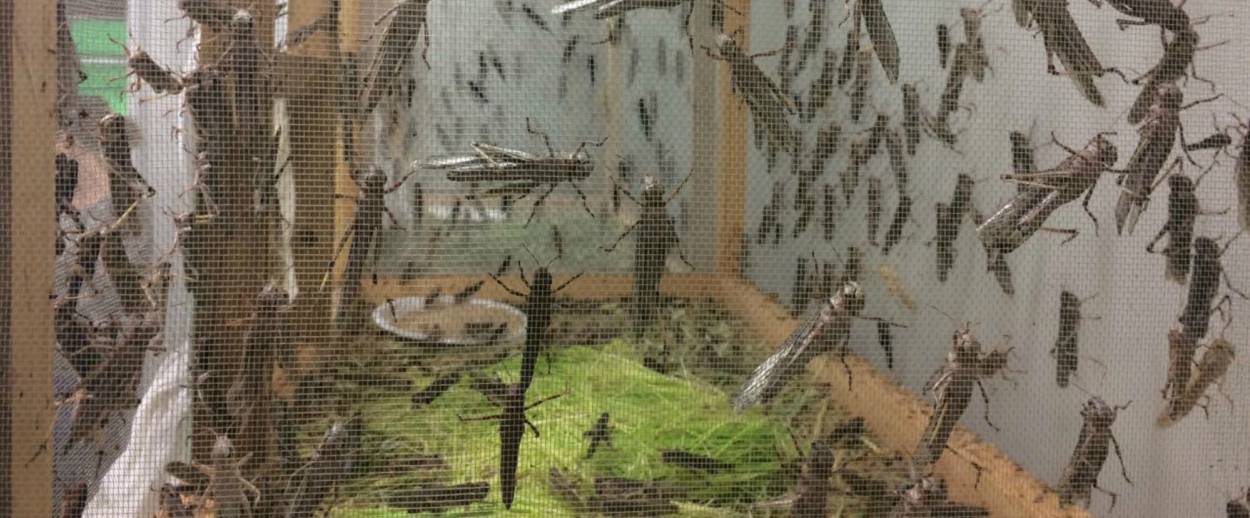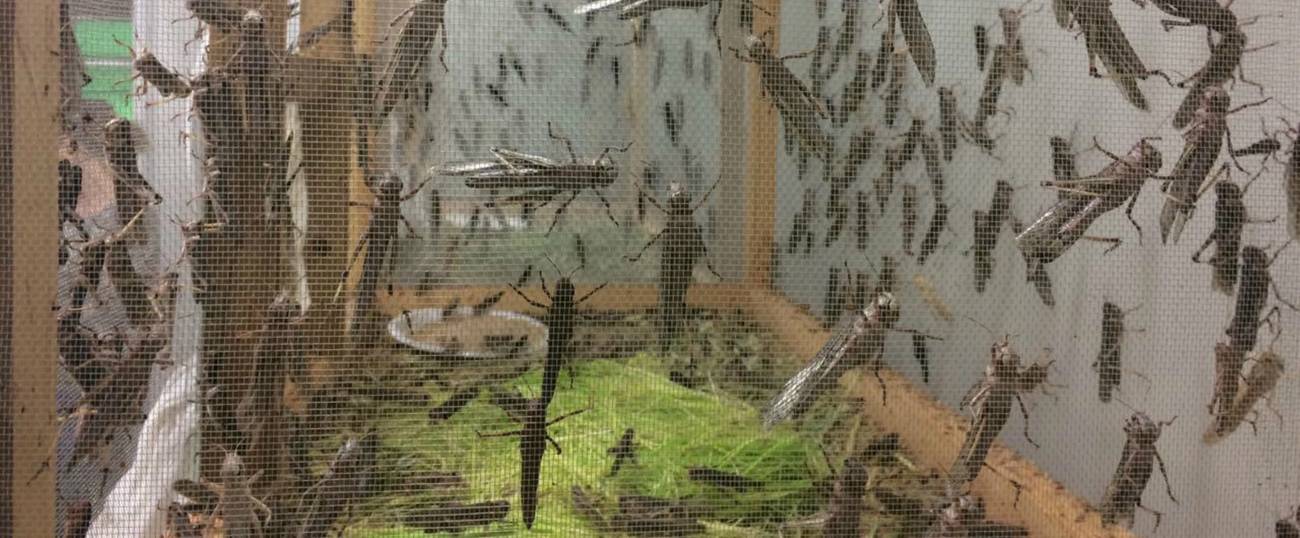From Cricket Protein to Super Sugar, the Israeli Food Tech Scene Is Booming
Start Up Nation takes on dinner




Some start-up companies are quietly finding new ideas to change the way we think, produce, and eat food. Their goals vary. Some want to make the food we eat safer, some want to make it more nutritious, others want to make it environmentally sustainable. Israel, its northern region of the Galilee in particular, is shaping up to become a new hub for these start-ups. There may be few of them, but the solutions they’re serving are turning heads among investors and companies from overseas.
One, called Inno-Bev, has created a plant-based drink that keeps El-Al pilots awake during long flights. Another one, SuperMeat, develops lab-made chicken meat, has raised $3 million, and it’s only in its seed phase of funding. To respond to the needs of this emerging community of innovators, in 2015 the Strauss Group opened in the city of Ashdod The Kitchen, an incubator for food-tech start-ups.
Many food-tech companies are busy researching new proteins. The demand for alternative protein sources has skyrocketed, and experts have been looking for them virtually everywhere.
Dror Tamir, co-founder and CEO of Hargol, found proteins in grasshoppers. Lots of proteins. Together with his business partner Chanan Aviv, who’d been working on insect breeding for 30 years, Tamir began growing several species of grasshoppers in a garage in 2014. Today, he runs the world’s first commercial farm producing grasshoppers.
Although Hargol is now a successful company, it’s not hard to believe how difficult it was for its founders to find investors when they first started developing the idea. People in Israel would tell Tamir that his product was disgusting. An investor once told him: “It’s too exotic.”
Over the last years, people have become more accustomed with the notion of insects as a culinary delicacy. In 2012, René Redzepi, the chef of the world famous Danish restaurant Noma, shocked the British press after serving ants at a hotel in London. Convincing investors that a grasshopper farm was worth the risk, however, was quite a struggle; although countries like Japan were more open to the idea, the start-up first had to get funding locally.
But the nutritional properties of the grasshopper were too great to remain ignored. Up to 70 percent of the animal’s content is protein; it has amino acids, and is low in saturated fats and cholesterol. On top of that, the taste is described as “neutral” (full disclosure: I have never tasted it so I cannot fact-check this). At last, in 2016, TrendLines, an Israel-based investment company, having developed an interest in edible insects, decided to invest in Hargol. Singapore-based Sirius Investments followed their lead.
Now Hargol ships its products worldwide: Their signature protein powder, which they achieve by drying and milling the insect, as well as dried and frozen whole grasshoppers. Tamir’s kids love them fried; chocolate-coated grasshoppers are also a must, he said. (Yet, he admitted the insects are not part of his family’s regular menu.)
Hargol claims its product is both kosher and halal. Grasshoppers are mentioned in the book of Leviticus and are considered to be parve, but only few Jews have maintained the tradition of eating them.
The demand is much higher than the company’s production capacity, Tamir said. Hargol’s business profile still looks very much like the one of a start-up, with only nine full-time employees and a few more subcontractors. That’s why the company is building a second farm, five times larger than the first, and an industrial model that could be built anywhere in the world. Their center for research and development, however, will remain in Israel.
Other companies are developing new solutions to check for food safety.
Inspecto, for instance, is working on a portable device that detects contaminants in food, like residues of fertilizer. The device can be adopted and used by anyone in the food supply chain, from the farm all the way to the supermarket.
One of the most advanced start-ups in this field is Jerusalem-based Yarok, a word that means “green” in Hebrew. So many start-up companies define their business model as “disruptive”—communication and PR managers often abuse of this term when they try to sell a product. But Yarok’s invention is truly disruptive, unique and valuable; it’s a microbiological test which allows to check for bacteria in food in 45 minutes.
Whoever works in the food industry knows it—testing for bacteria in food is a long process. Fruit and vegetables, for example, must be carried from the farm into the consumers’ house in a short span of time, so that they can remain fresh. The tests in use now take up to 72 hours and the results are often inaccurate.
In 2016, CNN produced a video on how the E.coli bacteria can easily get into anyone’s salad; it soon became viral. Earlier this year, two people died and 57 people got sick due to an outbreak of E.coli in the United States; the source of contamination was possibly romaine lettuce.
Yarok’s product, a kit for a quick microbiological test which detects listeria, salmonella and other bacteria, is a finished prototype. One of Israel’s largest dairy factories has already adopted one.
“We could have developed this product also for the pharmaceutical and medical industry, but we chose to focus on food, because we have more experience in the field, and times are faster,” Jonathan Sierra, the co-founder and CEO of Yarok, told Tablet. Sierra is originally from Italy, but he’s lived in Israel for many years. Last year, Yarok won the Innovation Award of the United Nations Industrial Development Organization.
Many European companies are interested in their solution, but few of them are ready to travel to Israel. “I think they’re wary,” said Sierra. So he opened a demonstrations lab in Bergamo, in northern Italy, which is attracting many more potential partners from Europe than the lab in Jerusalem.
Several players in the food-tech ecosystem work on finding new solutions to substitute or reduce sugar in our diets. The fact that sugar is bad for our health is so “old news,” said Liat Cinamon, who is the vice-president of business development at the Petach-Tikva-based start-up DouxMatok. “We know that already.”
Just until recently, artificial sweeteners seemed to be the solution to this problem. But then, experts backtracked a bit, saying that also these products may be unhealthy and even addictive. So the minds behind DouxMatok thought of reducing sugar consumption without compromising the taste of the food we eat by delivering its sweet taste more efficiently to our taste buds.
“We take the sugar and load it on a mineral carrier which maximizes its sweetness,” explained Cinamon. Thanks to the carrier, less sugar is needed and less calories are ingested. Israeli founders loved this solution so much, that the company closed a successful first round of investments last summer, raising $8 million. Now they want to take over the food industry, convincing food production companies to reformulate their products with them; but also want to work with companies that produce sugars, as well.
DouxMatok’s story began roughly 50 years ago, when the prominent chemical researcher Avraham Baniel was trying to find new solutions to make meals in Israeli schools more filling in a time of economic austerity. He suggested to use starch in the meals, because it would deliver the food in a way that would make it more satisfying for the children. Decades later, his son Eran, an entrepreneur, used a similar thought process to create DouxMatok. Eran had just sold his previous company, and in 2013 he partnered with his father, who is now 100 years old, to dive into the world of food-tech.
“Avraham sometimes comes to brainstorm with us,” Cinamon told Tablet.
At the moment, the researchers at DouxMatok are hoping to expand their knowledge to salt, too, in order to develop a similar product to their sugar, but they’re still at the initial stages of the research.
What helped them grow so fast over the last year was “timing,” said Cinamon. “Right now there is a huge need for sugar reduction. Not only for health concerns, but also because of regulations—some states promote taxes on sugary drinks, there are new labeling rules in the United States, and so on. Time is on our side.”
Simone Somekh is a New York-based author and journalist. He’s lived and worked in Italy, Israel, and the United States.